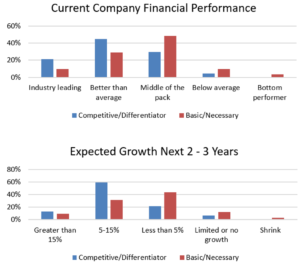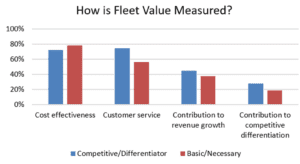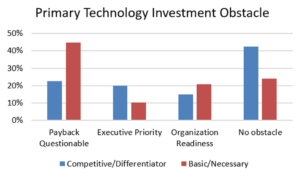 Fleets are a double-edged sword. On one hand, they can be a competitive differentiator for companies that compete on delivery service. On the other hand, they can be expensive to operate. So, what makes for a successful fleet operator? In our Fleet Management Strategies of Top Performers, Descartes recently surveyed 130 companies with fleets across the globe to determine how leaders think differently. Some of the results are simple but surprising, and the charts tell the story. We are going to see a separation in competitive and financial performance between those companies that understand the true value of the fleet and those that don’t. Here are four reasons why this is happening.
Fleets are a double-edged sword. On one hand, they can be a competitive differentiator for companies that compete on delivery service. On the other hand, they can be expensive to operate. So, what makes for a successful fleet operator? In our Fleet Management Strategies of Top Performers, Descartes recently surveyed 130 companies with fleets across the globe to determine how leaders think differently. Some of the results are simple but surprising, and the charts tell the story. We are going to see a separation in competitive and financial performance between those companies that understand the true value of the fleet and those that don’t. Here are four reasons why this is happening.
Top performers have senior management who believe in the strategic value of the fleet.
 It is a self-fulfilling prophecy. The best financial performers AND fastest growing companies are those where management believes the fleet is part of their competitive differentiation. The companies that don’t do as well financially put a low value on the fleet and suffer accordingly. It’s a simple story; fleets are largely used for customer-facing deliveries. The last mile is the last word in the total customer experience, and companies that miss this key point don’t reap the same financial benefits. The charts throughout this post compare the results of those companies who believe in the competitive differentiation of the fleet, and those who believe the fleet is a basic necessity or necessary evil.
It is a self-fulfilling prophecy. The best financial performers AND fastest growing companies are those where management believes the fleet is part of their competitive differentiation. The companies that don’t do as well financially put a low value on the fleet and suffer accordingly. It’s a simple story; fleets are largely used for customer-facing deliveries. The last mile is the last word in the total customer experience, and companies that miss this key point don’t reap the same financial benefits. The charts throughout this post compare the results of those companies who believe in the competitive differentiation of the fleet, and those who believe the fleet is a basic necessity or necessary evil.
Top performers focus more on a broader set of value metrics.
 Fleet operations costs can be large and are a key focus for most companies that have them; however, costs are only part of the story. Many companies fail to capture the greater value of the fleet with the metrics that show value as a competitive differentiator or revenue growth enhancer. This ties directly into the perception that senior management has of the fleet. To be successful here, fleet operations need to enlist the “revenue and customer owners” to track the impact that the fleet has on the overall business. The chart below shows that there is still plenty of opportunity for all fleet operators to do a better job capturing the total value of their fleet.
Fleet operations costs can be large and are a key focus for most companies that have them; however, costs are only part of the story. Many companies fail to capture the greater value of the fleet with the metrics that show value as a competitive differentiator or revenue growth enhancer. This ties directly into the perception that senior management has of the fleet. To be successful here, fleet operations need to enlist the “revenue and customer owners” to track the impact that the fleet has on the overall business. The chart below shows that there is still plenty of opportunity for all fleet operators to do a better job capturing the total value of their fleet.
Top performers have more aggressive fleet management strategies.
 The adage that you are the sum of your actions shows loudly here. Competitiveness through customer delivery is a highly evolving area and the fleet is a critical component. For example, there are now numerous examples of how retailers and distributors are using new and highly innovative ways to be faster, more agile, and provide value-added delivery services to capture customers and drive top line growth. To stay ahead, leading fleet operators are constantly reinventing themselves to provide meaningful service differentiation for their customers. Delivery practices that were deemed leading-edge even 5 years ago, such as next-day delivery with an all-day time window, are now considered a basic capability by many customers.
The adage that you are the sum of your actions shows loudly here. Competitiveness through customer delivery is a highly evolving area and the fleet is a critical component. For example, there are now numerous examples of how retailers and distributors are using new and highly innovative ways to be faster, more agile, and provide value-added delivery services to capture customers and drive top line growth. To stay ahead, leading fleet operators are constantly reinventing themselves to provide meaningful service differentiation for their customers. Delivery practices that were deemed leading-edge even 5 years ago, such as next-day delivery with an all-day time window, are now considered a basic capability by many customers.
Top performers will invest more and increase the competitive differentiation of their fleet-based services.
 Continued investment in the fleet is going to be essential to support constantly evolving business models, pressure on operating costs, and compliance with government regulations. Fleet technology is a critical enabler of these requirements and is also rapidly evolving. Because top performers understand the broader value picture of their fleets, they are better prepared to make the investments that keep them ahead of the pack.
Continued investment in the fleet is going to be essential to support constantly evolving business models, pressure on operating costs, and compliance with government regulations. Fleet technology is a critical enabler of these requirements and is also rapidly evolving. Because top performers understand the broader value picture of their fleets, they are better prepared to make the investments that keep them ahead of the pack.
Last Word
There has never been a more important time for fleets to play a critical part in their companies’ success. If senior management doesn’t see that opportunity, however, they will find themselves wondering why their company isn’t a top performer or worse. The challenge for fleet operations is to sell the broader value of the fleet beyond the logistics organization and to the business leaders that own the revenue and customers. To learn more about how top performers think and act differently, take a look at the Fleet Management Strategies of Top Performers Report. What is your organization doing to make your fleet more competitive? Let me know.
As Executive Vice President, Marketing and Services, Chris Jones (CJones@descartes.com) is primarily responsible for Descartes marketing activities and implementation of Descartes’ solutions. Chris has over 30 years of experience in the supply chain market, including the last 10 years as a part of the Descartes leadership team. Prior to Descartes, he has held a variety of senior management positions in other organizations including: Senior Vice President at The Aberdeen Group’s Value Chain Research division, Executive Vice President of Marketing and Corporate Development for SynQuest and Vice President and Research Director for Enterprise Resource Planning Solutions at The Gartner Group and Associate Director Operations & Technology for Kraft Foods.


















Leave a Reply